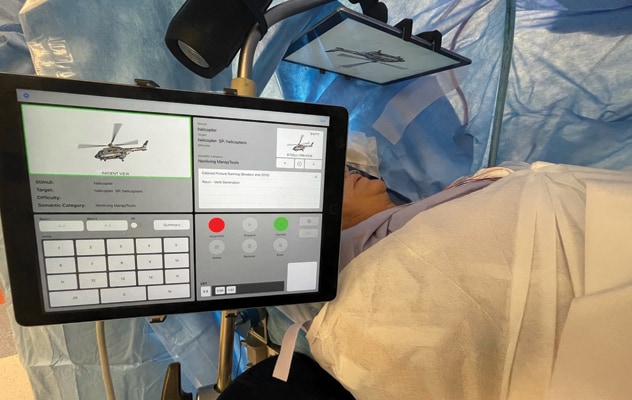May 21, 2021
Mayo Clinic uses innovative technology to map patients' cognitive functions during awake brain surgeries. The latest tool is NeuroMapper, a tablet-based testing platform developed by David S. Sabsevitz, Ph.D., initially at the Medical College of Wisconsin in collaboration with the University of Wisconsin-Milwaukee, and with continued development at Mayo Clinic in Jacksonville, Florida. Dr. Sabsevitz is currently a neuropsychologist at Mayo's Jacksonville campus, where NeuroMapper has been used in more than 200 surgeries.
"In the past, we have relied on very simplistic and inefficient brain-mapping methods in the operating room. More-detailed and sophisticated evaluation of patients is needed to truly capture the variability in the locations of individuals' brain functions and avoid resecting functionally important tissue," Dr. Sabsevitz says. "Advanced imaging and mapping translate to better surgical outcomes."
اختبار معرفي مُفصَّل

اختبار معرفي مُفصَّل
صورة أثناء العملية تُظهر منصة NeuroMapper على الأجهزة اللوحية التي يستخدمها اختصاصي طب النفس العصبي والمريض في آن واحد.
The NeuroMapper platform comprises a tablet attached to the operating room table, which the patient can see and interact with, and another tablet used by a neuropsychologist to select tests for the patient to perform. The neuropsychologist's tablet displays and tracks the patient's test results.
The platform contains comprehensive, conceptually informed language tests that measure not just the ability to name a picture but also a wide range of other linguistic functions that are at risk during surgery. In addition, NeuroMapper contains paradigms that allow for the mapping of nonlanguage functions, such as attention, higher level problem-solving and multitasking.
"The platform captures a great deal of information and displays it to the examiner in real time," Dr. Sabsevitz says. "We can monitor brain functions with increased sensitivity and use that information for clinical decision-making. As a result, our cohesive, multidisciplinary team is able to attempt high-risk resections for the treatment of epilepsy or brain tumor."
A multidisciplinary approach is key to awake brain surgery. In addition to including neuropsychologists, Mayo Clinic's treatment team involves neurosurgeons, neurologists, neuro-anesthesiologists and neuroradiologists.
Systemizing brain mapping
At Mayo Clinic, patients undergo detailed neuropsychological assessments before awake brain surgeries. Functional MRI and diffusion tensor imaging are routinely used for pre-surgical brain mapping.
"Our radiology department has extensive experience in functional brain mapping and advanced structural imaging," Dr. Sabsevitz says. "Everything we do in the pre-surgical work-up and in the operating room is designed to minimize morbidity."
During surgery, a patient's reaction times can be compared to the results of that individual's pre-surgical testing. "If the patient's accuracy drops or responses are slowing down, we can alert the surgeon," Dr. Sabsevitz says.
As described in a video article published in the September 2020 issue of World Neurosurgery, NeuroMapper allows the surgical team to efficiently collect comprehensive information. "We can do much more extensive testing in a given timespan," Dr. Sabsevitz says. "Before we had this platform, it was very hard to keep track of all this information."
NeuroMapper is currently used at approximately 25 institutions across the United States. Mayo Clinic is organizing a research consortium of platform users to collect data and to better systemize brain mapping.
"The approach to brain mapping has been incredibly variable across institutions," Dr. Sabsevitz says. "Our hope is that by introducing a more structured mapping platform, we can pool NeuroMapper data across institutions to answer very complex research questions that accelerate our understanding of the brain and improve surgical techniques."
Mayo Clinic is also working to integrate the mapping of sensory motor systems into the platform. Testing is underway on devices that would objectively and precisely measure a patient's strength and speed of movement while simultaneously testing functions such as language and attention.
"NeuroMapper could alert us if a patient is getting weaker while interacting with the device," Dr. Sabsevitz says.
As a high-volume center for awake brain surgery, Mayo Clinic also works to educate patients about the procedure. "Being told that you need to have an awake brain surgery is incredibly stressful. At Mayo, we spend a lot of time preparing our patients and their families for these procedures through supportive counseling and education," Dr. Sabsevitz says. "The feedback we get from patients is that we turned a potentially scary and traumatic situation into something quite doable."
For more information
Medical College of Wisconsin.
University of Wisconsin-Milwaukee.
Domingo RA, et al. Awake craniotomy with cortical and subcortical speech mapping for supramarginal cavernoma resection. World Neurosurgery. 2020;141:260.